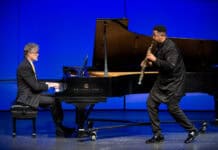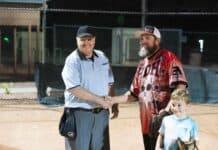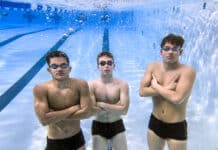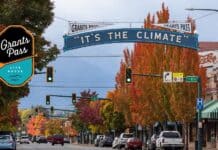Public speaking ranks high among many people’s greatest fears, but not for Lew Hoyt. By Tyler Midkiff
Larson Newspapers
Public speaking ranks high among many people’s greatest fears, but not for Lew Hoyt.
The former Olympic high jumper, Navy fighter pilot, TOPGUN instructor and Sedona’s 2006 Citizen of the
Year was faced with the possibility of losing the ability to speak when he was diagnosed with throat cancer three years ago.
Oncologists at the Mayo Clinic in Scottsdale saved Hoyt from that fate. For a year and a half, he took each breath through a hole in his neck, but those days are behind him.
“I speak with a little bit of a lisp,” Hoyt said, “but I’m so happy to be able to speak. What you see is what you get.”
On Wednesday, March 26, Hoyt spoke between frequent sips of water — a substitute for the salivary glands destroyed during surgery — to the Sedona Welcomers during the group’s monthly luncheon at Hilton Sedona Resort & Spa, in the Village of Oak Creek.
“It gives you a whole new perspective on life,” Hoyt said. “I no longer try to live my life just for me.”
“Life is precarious. Life is short. Life is a gift, but we take it for granted,” he said.
Years ago, Hoyt sat behind the controls of American fighter jets above the jungles of Vietnam. Taking life for granted seemed necessary for survival.
“We were very cocky and arrogant,” Hoyt said of himself and his fellow pilots. “We strutted around …. We had to believe that we were invincible — that we could survive anything … and that attitude prevailed in so many other things that I did.”
In the early years of the Vietnam War, the United States lost one plane for every two North Vietnamese planes shot down, according to Hoyt. American pilots had forgotten how to dogfight.
That’s why the TOPGUN, or U.S. Navy Strike Fighter Tactics Instructor program was founded. Hoyt was among the pilots selected as instructors, he said.
Within a short time, the downed plane ratio increased to 13 to 1, according to Hoyt, who said the U.S. Air Force soon followed suit and developed a similar program — the U.S. Air Force Fighter Weapons School.
Hoyt later flew with and
helped to train Israeli, Egyptian and Kuwaiti air forces before launching a career as a commercial pilot.
He spent 25 years traveling the world with Delta Air Lines — not nearly as exciting as flying fighter jets, Hoyt said, but less grueling and still a fulfilling career.
Before becoming a commercial pilot and joining the military, Hoyt attended the University of Southern California on a track scholarship. At the time, USC’s track and field team was among the best, according to Hoyt, and through it, he competed as a high jumper in the Olympics.
Hoyt’s unwillingness to accept second-best began on that team, he said.
By picking apart his techniques and focusing on the mind — the biggest obstacle to success — Hoyt said he learned things that continue to support him in every endeavor, including his latest triumph over cancer.
“I love people and I love to be alive,” Hoyt told the Sedona Welcomers, it’s a joy.




















